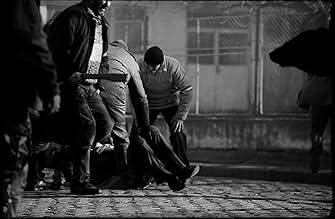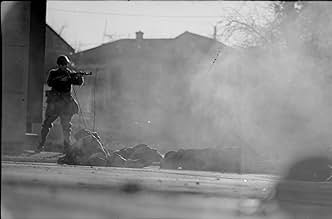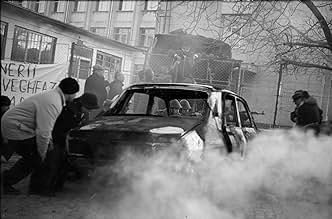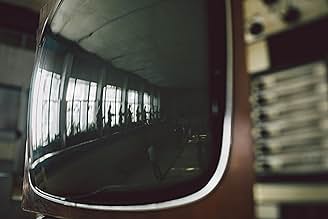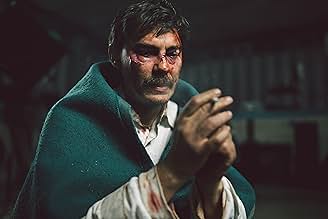AVALIAÇÃO DA IMDb
7,4/10
2 mil
SUA AVALIAÇÃO
Durante a revolução de 1989 na Romênia, Sibiu testemunha um violento ataque a uma delegacia de polícia que se transforma em confrontos armados entre soldados, policiais, manifestantes e a po... Ler tudoDurante a revolução de 1989 na Romênia, Sibiu testemunha um violento ataque a uma delegacia de polícia que se transforma em confrontos armados entre soldados, policiais, manifestantes e a polícia secreta.Durante a revolução de 1989 na Romênia, Sibiu testemunha um violento ataque a uma delegacia de polícia que se transforma em confrontos armados entre soldados, policiais, manifestantes e a polícia secreta.
- Direção
- Roteiristas
- Artistas
- Prêmios
- 17 vitórias e 10 indicações no total
- Direção
- Roteiristas
- Elenco e equipe completos
- Produção, bilheteria e muito mais no IMDbPro
Avaliações em destaque
📽 "Libertate" magnificently directed by Tudor Giurgiu and masterfully written by him together with Cecilia Stefanescu and Nap Toader, is a historical drama inspired by the great mystery behind the events of the dark days of December 1989 in Sibiu, where the fall of the communist regime leads to bloody confrontations between soldiers, policemen, civilian protesters and representatives of the secret police, all resulting in unprecedented chaos. This film really succeeds in transposing the audience in the time-space line, but more importantly in the minds of the protagonists, questioning more than ever the value of moral ethics and the power to keep yourself clean in a dystopia full of corruption.
🎞 A special characteristic of the story is the directorial and acting power to present a blurred overall picture, capable of connecting the narratives of different, doubtful perspectives, thus leading the audience to crucial moments where they even doubt the veracity of the protagonists...captive too in a world ruled by fear and lies. A psychological study of a fractured mindset imposed by the failed ideologies of a flawed system, but also an enchanting story designed to leave the audience with questions and personal analyses, quite recent events leaving us as spectators in the position of questioning our own inner revolution. A film that leaves its mark on the audience for a long time, truly a cinematic masterpiece, the opportunity to reflect and thus better understand the past and implicitly the future!
🎞 A special characteristic of the story is the directorial and acting power to present a blurred overall picture, capable of connecting the narratives of different, doubtful perspectives, thus leading the audience to crucial moments where they even doubt the veracity of the protagonists...captive too in a world ruled by fear and lies. A psychological study of a fractured mindset imposed by the failed ideologies of a flawed system, but also an enchanting story designed to leave the audience with questions and personal analyses, quite recent events leaving us as spectators in the position of questioning our own inner revolution. A film that leaves its mark on the audience for a long time, truly a cinematic masterpiece, the opportunity to reflect and thus better understand the past and implicitly the future!
"Freedom" or "Libertate" (2023), directed by Tudor Giurgiu and co-written by Cecilia Stefanescu, Tudor Giurgiu, and Nap Toader, stands out as a remarkable addition to the limited corpus of Romanian cinema that explores the events of December 1989 in Romania. At the age of 29, I experienced these historical moments firsthand while residing in neighboring Yugoslavia, where the "revolution" was broadcast continuously for 24 hours. Consequently, this film was essential for me to view.
The film successfully balanced various elements, including violence, humor, community, and political themes. The events of the 1989 revolution still remain shrouded in mystery, yet Tudor Giurgiu excelled in presenting most of the facts in a tangible manner. The casting was exemplary, and each line delivered was fluid, credible, and appropriate for the historical context. This film effectively transports the audience along the continuum of time and space, but more significantly, it delves into the psyches of the protagonists, raising profound questions about the significance of moral ethics and the ability to maintain one's integrity in a dystopian world rife with corruption.
It is my sincere hope that this film receives the acclaim it rightfully merits, as it stands as a true masterpiece.
The film successfully balanced various elements, including violence, humor, community, and political themes. The events of the 1989 revolution still remain shrouded in mystery, yet Tudor Giurgiu excelled in presenting most of the facts in a tangible manner. The casting was exemplary, and each line delivered was fluid, credible, and appropriate for the historical context. This film effectively transports the audience along the continuum of time and space, but more significantly, it delves into the psyches of the protagonists, raising profound questions about the significance of moral ethics and the ability to maintain one's integrity in a dystopian world rife with corruption.
It is my sincere hope that this film receives the acclaim it rightfully merits, as it stands as a true masterpiece.
10AEA0258i
The movie had the right amount of everything, be it violence, humour, community, or politics. The revolution of '89 has many secrets still, but the director and scenographer Tudor Giurgiu did a tremendous job in order to keep the facts palpable. The casting was perfect and every line was fluid, believable, accurate for the time in question. The metaphors used make it not only an action movie, but a psychological one, shaping every character, with flaws and faults. And still, at the end of it you pity and cry along them and start questioning yourself if you would have done things differently. I can only hope it receives the recognition it deserves, because it is a masterpiece.
(I saw it at a pre-screening. The premier is on the 6th of October)
(I saw it at a pre-screening. The premier is on the 6th of October)
I encourage people to watch this movie...however much watching it infuriated me. It is a compelling and, as previous posters (apparently mostly Romanian) have written, it is indeed an "immersive experience," and deserves to be viewed and applauded from an artistic standpoint. But it is unfortunately a deeply regrettable travesty from the point of someone who has spent decades investigating the events of the Romanian Revolution of December 1989. My first, of several, hopefully, episodic, entries, is to demonstrate that despite what Tudor Giurgiu, the director, has said in his many interviews, and what one reviewer, Eugen Istodor, has said...
"Vocea securistilor nu s-a auzit 30 si ceva de ani si filmul le da cuvantul." (Hotnews.ro 7 October 2023)..."The voice of the Securitate (communist era secret police) has not been heard for 30 plus years and this film gives them the floor."...there is nothing new in this story...in fact, it has been expressed repeatedly and has long since achieved a hegemony in the Romanian media and everyday life. (Tudor Giurgiu has spoken in public at these showings, I was there for one, about the "fake narratives (about the Army) that have dominated for 30 plus years...and about the supposedly dominant narrative of "the Glorious Army"...but let us test his claims here)...below, for English speakers, two famous public discussions of the Sibiu December 1989 events...from 1990 and 1997, therefore for 33 years and 26 years respectively...to be continued...
POET, ESSAYIST, AND NPR COMMENTATOR ANDREI CODRESCU in Sibiu in July 1990, seven months after the Romanian Revolution of December 1989
As my friends spoke, a strange feeling engulfed me. Most of what they said sounded true, but there seemed to be something missing, one element of the plot that no one cared to mention. Here, in the middle of this sumptuous feast, I experienced the eeriness of another (hardly new) revelation: They were all blaming the army for the shootings; none of them blamed the Securitate. And yet the official government line was that the Securitate-not the army-massacred all those people who were undeniably massacred in Bucharest, Sibiu, and elsewhere. Could my friends also have been ... ? I felt like drawing two fingers across my shoulder (a sign he had earlier related was used to communicate that someone had Securitate ties), but I had no one to do it for. In any case, the point they were making, and which was being corroborated everywhere these days, is that many shots had been fired, but few in defense of Ceausescu, He had been betrayed by everyone. Even his son, who'd been in charge at Sibiu, hadn't ordered anybody to fire at demonstrators. Ironically, the People's Army started shooting at the crowds at the same time that the army was officially coming over to "the side of the people." However, the shooting was intended to create more panic than corpses. Romania's TV revolution had only one side ...Everyone had been on it.
--"Big Chills: My High School Reunion in Romania," HARPER'S MAGAZINE, NOVEMBER 1990
and
Back in 1997, the American novelist and Pulitzer Prize Winner William McPherson wrote of what Valentin Ceausescu, communist dictator Nicolae Ceausescu's eldest son, told him about the events of the Romanian Revolution of December 1989. Here are some excerpts:
Valentin and I were having coffee in the Vox Maris, the same grand casino where the funeral feast was held. It was morning, two days after the funeral (of Nicu Ceausescu), and the crowds had not yet arrived.
--"Nicu was never groomed to be the successor. That was (only) the rumor." He paused for a moment. "But rumors even become the reality."
--"Yes. Especially in Romania."
--"Maybe others in the party thought it would be a good idea. He could command a lot of sympathy. He always wanted to look tough and act strong, but he wasn't. He was more like a child than anything else."
--"What about the 90 people killed in Sibiu?"
--"He did not order the shooting. I know when he's trying to lie, and he wasn't lying. I knew immediately. That's why I defended him so strongly."
--He paused and lit another Pall Mall. "Have you noticed? All the heroes in Sibiu now are the militia and the Securitate - all the dead people, and now they are the heroes of the revolution."
--"So the villains are now the heroes?"
--"Yes."
--And the heroes are now the villains.
The official toll of the dead, revised frequently with a final version released three years after the events, is 1,104; only 160 were killed before the dictator fled.
Curious - if the figures are accurate - that the majority of them were killed in Sibiu. "A lot of effort," Valentin once said, "to kill these two old people."
William McPherson, "A Balkan Comedy," The Wilson Quarterly, Volume 21, Issue 3 (Summer 1997)
Thank you, dear readers and watchers. --Domnul R.
POET, ESSAYIST, AND NPR COMMENTATOR ANDREI CODRESCU in Sibiu in July 1990, seven months after the Romanian Revolution of December 1989
As my friends spoke, a strange feeling engulfed me. Most of what they said sounded true, but there seemed to be something missing, one element of the plot that no one cared to mention. Here, in the middle of this sumptuous feast, I experienced the eeriness of another (hardly new) revelation: They were all blaming the army for the shootings; none of them blamed the Securitate. And yet the official government line was that the Securitate-not the army-massacred all those people who were undeniably massacred in Bucharest, Sibiu, and elsewhere. Could my friends also have been ... ? I felt like drawing two fingers across my shoulder (a sign he had earlier related was used to communicate that someone had Securitate ties), but I had no one to do it for. In any case, the point they were making, and which was being corroborated everywhere these days, is that many shots had been fired, but few in defense of Ceausescu, He had been betrayed by everyone. Even his son, who'd been in charge at Sibiu, hadn't ordered anybody to fire at demonstrators. Ironically, the People's Army started shooting at the crowds at the same time that the army was officially coming over to "the side of the people." However, the shooting was intended to create more panic than corpses. Romania's TV revolution had only one side ...Everyone had been on it.
--"Big Chills: My High School Reunion in Romania," HARPER'S MAGAZINE, NOVEMBER 1990
and
Back in 1997, the American novelist and Pulitzer Prize Winner William McPherson wrote of what Valentin Ceausescu, communist dictator Nicolae Ceausescu's eldest son, told him about the events of the Romanian Revolution of December 1989. Here are some excerpts:
Valentin and I were having coffee in the Vox Maris, the same grand casino where the funeral feast was held. It was morning, two days after the funeral (of Nicu Ceausescu), and the crowds had not yet arrived.
--"Nicu was never groomed to be the successor. That was (only) the rumor." He paused for a moment. "But rumors even become the reality."
--"Yes. Especially in Romania."
--"Maybe others in the party thought it would be a good idea. He could command a lot of sympathy. He always wanted to look tough and act strong, but he wasn't. He was more like a child than anything else."
--"What about the 90 people killed in Sibiu?"
--"He did not order the shooting. I know when he's trying to lie, and he wasn't lying. I knew immediately. That's why I defended him so strongly."
--He paused and lit another Pall Mall. "Have you noticed? All the heroes in Sibiu now are the militia and the Securitate - all the dead people, and now they are the heroes of the revolution."
--"So the villains are now the heroes?"
--"Yes."
--And the heroes are now the villains.
The official toll of the dead, revised frequently with a final version released three years after the events, is 1,104; only 160 were killed before the dictator fled.
Curious - if the figures are accurate - that the majority of them were killed in Sibiu. "A lot of effort," Valentin once said, "to kill these two old people."
William McPherson, "A Balkan Comedy," The Wilson Quarterly, Volume 21, Issue 3 (Summer 1997)
Thank you, dear readers and watchers. --Domnul R.
10Tb59
I have just had the privilege of seeing this tonight, at a pre-screening before the actual launch and I can say I was very happy and relieved to see these stories told so well and yet also not be a documentary, in spite of the mountains of research and effort that went into recreating some of the aspects depicted. Probably the best and most mature non-meta Romanian film.
Please go out and support it by seeing it in cinemas, starting October 6th - it's well worth it and it deserves to be seen if you're even remotely interested in Romanian films, history inspired stories - or, indeed, great movies in general!
Please go out and support it by seeing it in cinemas, starting October 6th - it's well worth it and it deserves to be seen if you're even remotely interested in Romanian films, history inspired stories - or, indeed, great movies in general!
Você sabia?
- ConexõesReferences Rocky, um Lutador (1976)
Principais escolhas
Faça login para avaliar e ver a lista de recomendações personalizadas
- How long is Freedom?Fornecido pela Alexa
Detalhes
- Data de lançamento
- Países de origem
- Central de atendimento oficial
- Idioma
- Também conhecido como
- Libertate
- Locações de filme
- Empresas de produção
- Consulte mais créditos da empresa na IMDbPro
Bilheteria
- Faturamento bruto mundial
- US$ 255.790
- Tempo de duração1 hora 49 minutos
- Cor
Contribua para esta página
Sugerir uma alteração ou adicionar conteúdo ausente

Principal brecha
What is the Canadian French language plot outline for A Revolução Romena (2023)?
Responda


